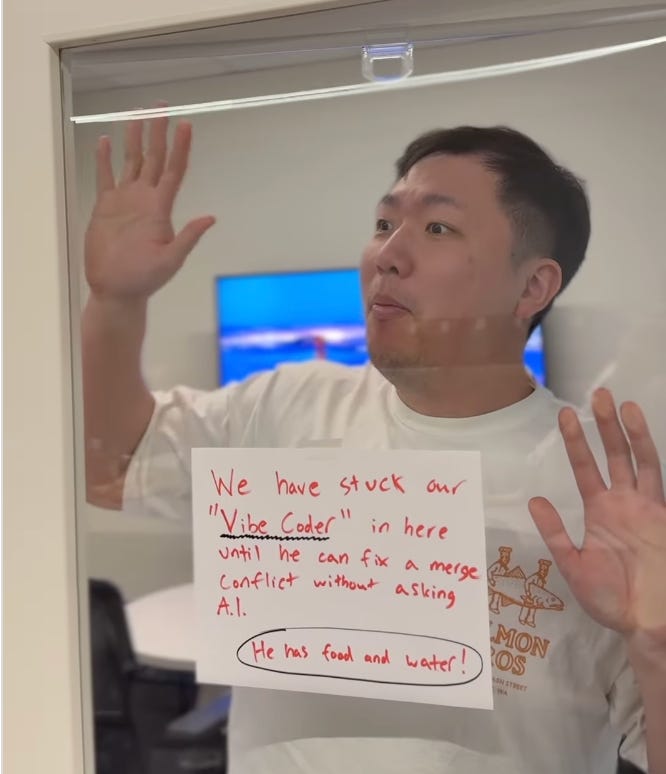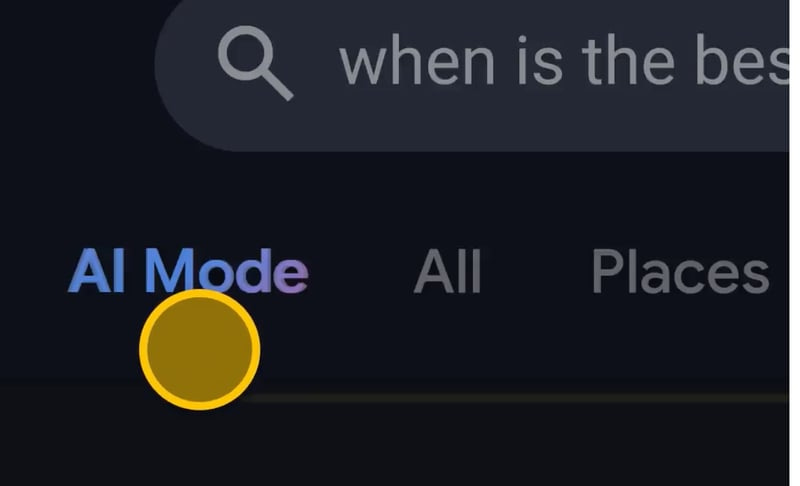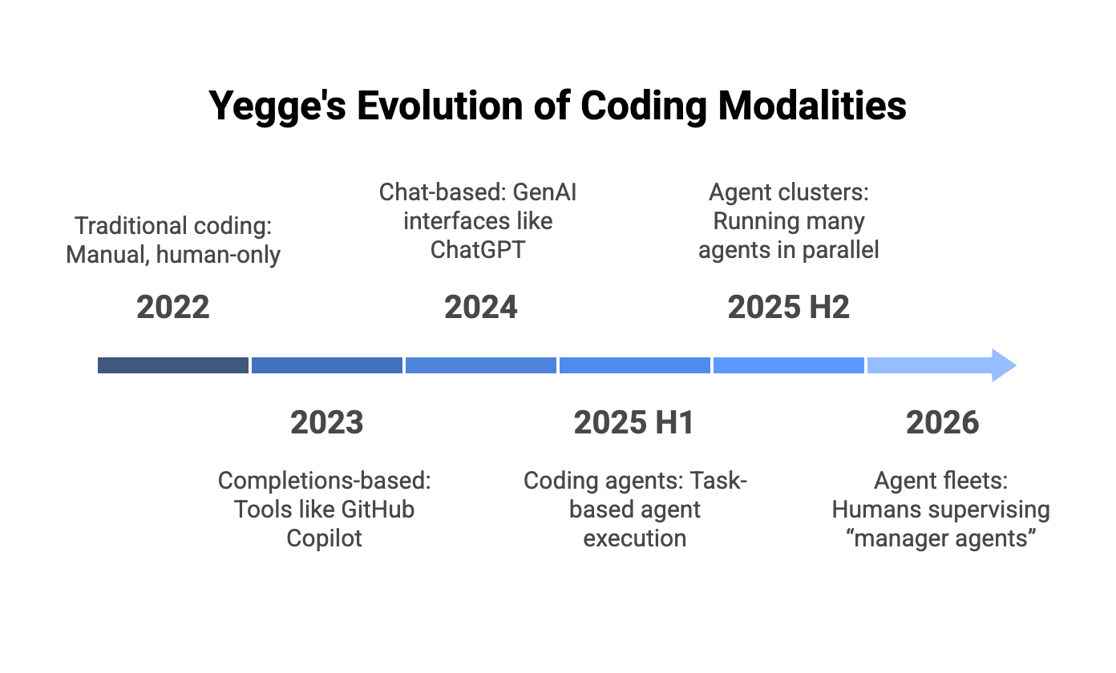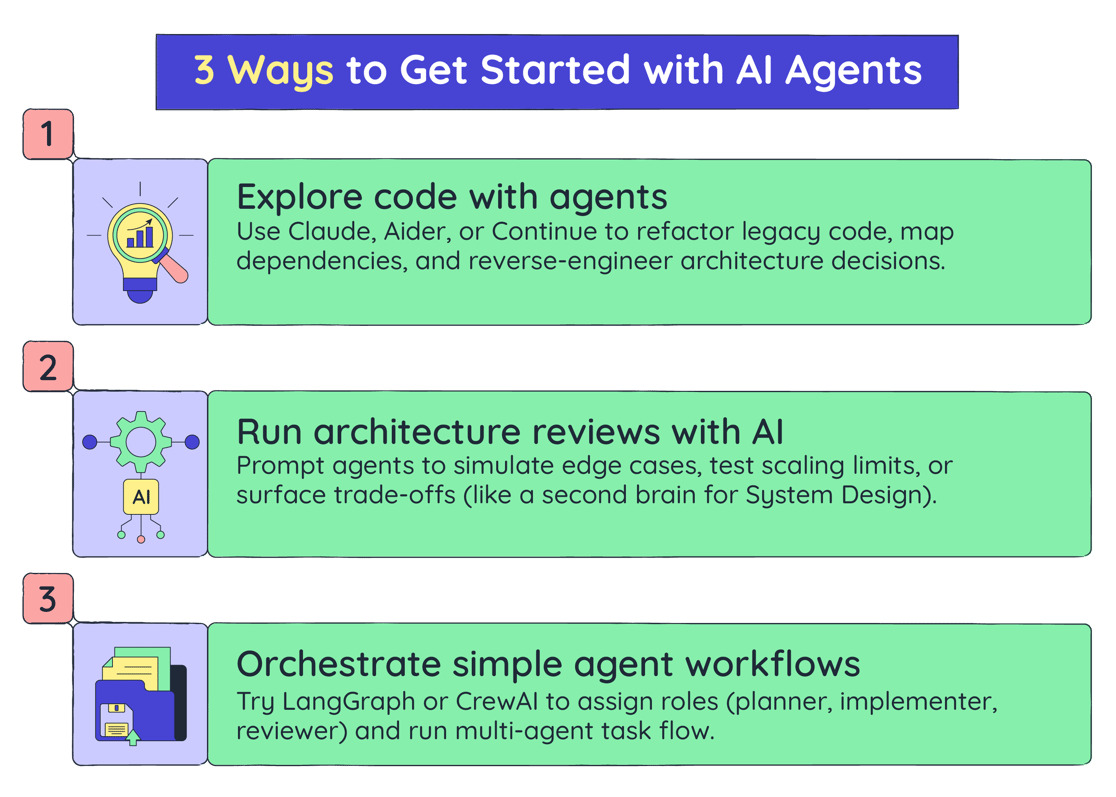We made a vibe coder debug without AI. It didn't go well.
From agent orchestration to LLM basics, here are the skills you need to know to grow your career in the AI era.
I'll start with a small joke:
Want to test a vibe coder's knowledge?
Trap him in a room until he can fix a bug without AI.
(That was the premise of one of our recent Instagram reels. Judging from the amount of comments and shares, people really seemed to resonate with this one.)
Vibe coders, don't worry, this is all in jest. Every generation has their quirks. Mine wrote code on floppy disks and thought SVN was futuristic.
For seasoned developers, it can be tempting to roll your eyes at vibe coders. After all, what would vibe coders do if ChatGPT went down?
But all kidding aside, here's the uncomfortable truth:
Vibe coders may end up with more job security than those of us who write code by hand.
While many people believe junior devs are the most at risk of losing jobs to AI, the fact is that senior developers are just as likely to be left behind in the AI era — and have significantly more at stake.
If you haven't started working with AI yet, you're already behind. Let's break down what that actually means in practice.
AI: A developer's new best friend
Remember the old adage: “The only difference between a developer and a non-developer is that a developer knows how to Google.”
We still love Google.
But even Google is becoming integrated with AI. So you can imagine how that sentence changes.
You've likely seen Google's AI Overviews, which generate a short summary for your specific query on the top of your search page. But now Google is beta testing AI Mode, a whole new tab that lets you interact with the Gemini model, ask follow-up questions, and continually iterate your search with AI.
AI Mode is powered by a custom version of Gemini 2.0, which uses a “query fan-out” technique, providing a comprehensive answer based on the context of various related searches.
…in other words, AI mode is automating much of the work a human researcher would manually do.
The same way Google became a support for debugging, AI is becoming the new search, the new Stack Overflow, the new rubber duck.
Bottom line: AI is your newest tool in your tool kit. You should learn how to use it.
Generative AI: The great divider and the great unifier
We’ve seen several revolutions in tech, from dot-com to cloud to mobile. But Generative AI is easily the most polarizing.
Think about your circle. You probably know someone who swears by it, and someone who avoids it like the plague.
Maybe that second person is you. I get it.
Generative AI has disrupted the way we work, and it didn't exactly ask for permission. If you like writing code by hand, it can feel like AI is intruding on your craft.
But AI isn’t asking if we want to adapt. It’s forcing us to.
In my conversations with peers and past coworkers, I’ve heard it all:
“I can’t trust it.”
“It’s a crutch for juniors.”
“It’s too unpredictable.”
But I’ve also seen devs use it to level up fast, ramp on new stacks, and free up more time for strategy and architecture. If you know how to use AI well with skills like prompt engineering, AI tools give you leverage..
Then there’s the job security question.
In McKinsey's Superagency in the Workplace report, 92% of business leaders who were surveyed indicated they'll increase AI investments in the next three years.
As AI adoption scales, individual contributors will be expected to know how to use these tools effectively. Whether we like it or not, GenAI is a skill set we all need to learn, or else we'll be left behind.
Agent fleets as the future of AI
If you haven't read Steve Yegge's “Revenge of the junior developer,” I highly recommend it.
Yegge echoes the stance that juniors will thrive in the AI era, if seasoned developers continue to resist AI workflows.
But he also outlines a very interesting future — one that goes far beyond replacing Google's search box with a chat interface.
Yegge predicts a future in which coding agents evolve into coding fleets, which are orchestrated by human developers.
Yegge breaks down the evolution of coding modalities in 6 "waves":
Traditional coding (2022): Manual, human-only
Completions-based (2023): Tools like GitHub Copilot
Chat-based (2024): GenAI interfaces like ChatGPT
Coding agents (2025 H1): Task-based agent execution
Agent clusters (2025 H2): Running many agents in parallel
Agent fleets (2026): Humans supervising “manager agents” that oversee entire agent teams
Right now, we’re in "Wave 4," where developers are delegating tasks to coding agents like Claude Code. We're also creeping into the next wave of agent clusters, where early agent adopters are now managing two or more agents in parallel.
The missing piece with coding agents and agent clusters is having supervisor agents that monitor, coordinate, and recover when workers get stuck. This is the next wave: agent fleets. And Yegge predicts we'll have these working in 2026.
A fleet-based future would mean human developers would barely write code. They would be orchestrating fleets: designing multi-agent systems, defining agent roles and responsibilities, handling coordination logic, and building fallback mechanisms. Tools like CrewAI, LangGraph, and Autogen will be key, alongside System Design, observability, and failure recovery skills.
Agent fleets might not be mainstream in 2026, but I do think Yegge's prediction for agent fleets is spot-on. And it might catch on even sooner than we might cautiously expect.
Agents are expensive, and models still need more improvement. But have no doubt those models will evolve fast, and companies are showing no signs of slowing down AI investments.
The Generative AI boom of 2023 caught many of us off guard. The shift to agent-based development might too — so it's best to start gearing up now.
Non-negotiable AI skills you'll need
First, these are the core AI skills you should start with:
Prompt engineering: Learn to craft inputs that guide models toward reliable, nuanced output. This is the new keyboard shortcut.
AI integration: Build features that embed models inside your stack. Tools like LangChain make it easier to connect models with tools, data, and app logic.
Generative AI System Design: Understand how to design GenAI-powered systems for real-world use cases like text, image, or speech generation.
Once you’re comfortable with the basics, your next step is to start getting hands-on with AI agents.
Here are 3 tactical ways to get started with agents:
Explore and refactor code with agents: Use tools like Claude, Aider, or Continue to navigate legacy codebases, map dependencies, and generate smart refactors. It's like another dev who reads the repo for you, and never forgets what’s in the README.
Run architecture reviews with AI: Prompt agents to simulate edge cases, flag bottlenecks, or audit trade-offs in your designs. Bonus: set up multi-agent “debates” (e.g. performance vs. maintainability) to surface blind spots before production does.
Orchestrate multi-agent workflows: Use LangGraph or CrewAI to assign roles like planner, implementer, and reviewer. Start small (e.g., have one agent generate tests and another validate schema) and build toward full cognitive pipelines.
As a bonus, you can dig into more specialized skills relating to LLM models. These are powerful accelerators if you’re going deep:
LLM pipeline anatomy: Dive into prompt templates, vector stores, retrieval, tool calling, and how it all connects.
Fine-tuning & evaluation: Learn to adapt base models with LoRA, RAG, or evaluation harnesses when off-the-shelf isn’t good enough.
Don't sleep on it. Embrace AI.
Those long, heads-down hours writing code solo are fading fast into nostalgic memories (alongside CD-ROMs and Nintendo 64 cartridges).
Even if your company hasn't been using AI, and you've been doing great without it for 10+ years, the world outside is evolving faster than you might imagine. You need to build AI skills in your personal time. If you find yourself job hunting tomorrow, AI skills will be non-negotiable.
You can get started with table stakes GenAI skills with some of these Educative courses:
All You Need to Know About Prompt Engineering: If you're new to AI tools, start here to learn effective prompting
Unleash the Power of Large Language Models Using LangChain: Leverage LLMs to build powerful AI features with LangChain, and learn LangGraph basics for creating multi-agent systems.
Grokking Generative AI System Design: Understand how GenAI systems work under the hood so you can lead and strategize scalable AI systems
Fine-Tuning LLMs Using LoRA and QLoRA: Gain insights into fine-tuning LLMs with LoRA and QLoRA
Build AI Agents and Multi-Agent Systems with CrewAI: Learn to create AI agents and orchestrate multi-agent systems
You can find other courses covering RAG through GenAI product development in Educative's Generative AI hub.
Whatever you do, don't sleep on it. AI upskilling is the best thing you can do right now. GenAI is changing the game for everyone — and those who lean in now will be the ones still standing when the dust settles.
Do you have any concerns or questions about AI and the future of software development? Leave a comment and let me know. I'd love to cover it in a future post.
Happy learning!
– Fahim






